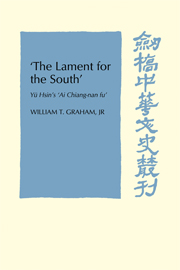Book contents
- Frontmatter
- Contents
- Dedication
- Preface
- Introduction
- 1 The historical background
- 2 The fu in the Six Dynasties
- 3 ‘The Lament for the South’
- 4 Commentary
- Appendix I Historical and biographical sources
- Appendix II Yü Hsin's career
- Appendix III Editions and commentaries
- Appendix IV The date of the ‘Lament’
- Appendix V Yü Hsin and Ssu-ma Ch'ien
- Appendix VI Two Sui shu anecdotes
- Appendix VII Genealogy
- Notes
- Bibliography
- Character glossary
- Index
Appendix III - Editions and commentaries
Published online by Cambridge University Press: 04 August 2010
- Frontmatter
- Contents
- Dedication
- Preface
- Introduction
- 1 The historical background
- 2 The fu in the Six Dynasties
- 3 ‘The Lament for the South’
- 4 Commentary
- Appendix I Historical and biographical sources
- Appendix II Yü Hsin's career
- Appendix III Editions and commentaries
- Appendix IV The date of the ‘Lament’
- Appendix V Yü Hsin and Ssu-ma Ch'ien
- Appendix VI Two Sui shu anecdotes
- Appendix VII Genealogy
- Notes
- Bibliography
- Character glossary
- Index
Summary
Yü Hsin's works were originally collected during his own lifetime by his friend Yü-wen Yu, the Northern Chou Prince of T'eng. This first collection, of 579, no longer survives; all current editions of the works are reconstructions from quotations in encyclopedias, etc. A good deal has certainly been lost, but almost all the surviving works are apparently intact, not fragmentary. There is also a problem with false attributions, but this involves only a few minor pieces. The ‘Lament’ itself is as surely by Yü Hsin as Paradise Lost is by Milton.
The standard edition of the works is the Yü Tzu-shan chi, with commentary by Ni Fan; it appears in the Ssu-pu pei-yao series, among other places. Because of its ready availability, I have used this as my basic text and have cited as Works the Hu-pei hsien-cheng yi-shu facsimile reprint of Ni's first edition of 1687. Ni's text is generally good, but his commentary is less satisfactory. It is, admittedly, of staggering length, about 50,000 words on 3400 or so words of text of the ‘Lament’, for example, but a great deal of it is irrelevant or forced.
The modern scholar Kao Pu-ying used Ni's work as the basis for his ‘Commentary on “The Lament for the South”’ (‘Ai Chiang-nan fu chien’). More capable than Ni, Kao added much valuable information from other commentators as well as his own corrections.
- Type
- Chapter
- Information
- 'The Lament for the South'Yu Hsin's 'Ai Chiang-Nan Fu', pp. 170 - 172Publisher: Cambridge University PressPrint publication year: 1980



